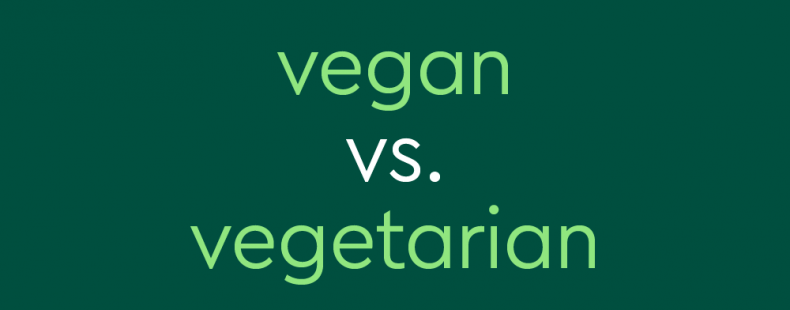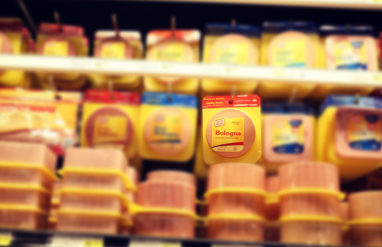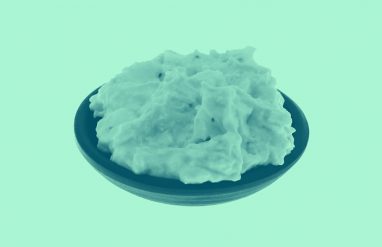More and more people are following vegan or vegetarian diets. And you’ve probably noticed a lot of restaurant menus marking whether a dish is vegan or vegetarian. But what exactly is the difference?
The difference involves more than just whether a person eats cheese. We’ll break down what each word means, what vegans and vegetarians do and don’t eat, and what the word vegan means beyond eating. We’ll even define some related terms, including plant-based, flexitarian, and pescatarian.
⚡ Quick summary
A vegetarian is someone who follows a vegetarian diet—they don’t eat meat of any kind (beef, chicken, fish—no animal flesh at all). The word vegan typically refers to someone who doesn’t eat or use any products from animals—vegans don’t eat meat or dairy, and they often don’t eat other animal-derived foods like honey. People who consider themselves vegans typically also avoid using nonfood products made from or by animals, including things like leather, fur, wool, or cosmetics or perfumes with animal-derived ingredients.
What does vegan mean?
The word vegan can be an adjective (as in a vegan diet) or a noun (as in I’m a vegan). In general, vegans avoid eating or using things that are either from animals or made by animals. In terms of diet, this means not consuming any meat or dairy products, or other animal-derived products, such as honey. While some people may simply follow a vegan diet, people who consider themselves vegans usually also don’t use animal-derived products, such as leather, fur, or wool. They also avoid animal ingredients in cosmetics (such as dyes made from insects), perfumes (such as components from animal scent glands), and other items. Vegans also often reject products that have been tested on animals. However, not all people who call themselves vegans strictly adhere to all of these restrictions.
There are many reasons why a person may be vegan. While many people adopt a vegan diet for health or nutrition reasons, many vegans base their consumption choices on a belief in the importance of animal welfare. Others may have climate-related concerns about the contribution of meat production to carbon dioxide levels in the atmosphere. In many cases, adherence to veganism is based on a combination of these or other factors.
What do vegans eat? And what can’t vegans eat?
A vegan diet is often considered plant-based—meaning it consists entirely or mainly of foods that come from plants, including vegetables, fruits, and grains. Vegan protein sources include beans, nuts, legumes, and seeds.
Vegans don’t eat animal products or animal-derived products, including meat, dairy products (like milk, cheese, and butter), or eggs.
There are many processed products that serve as vegan alternatives for these items. These include things like vegan “butter” and vegan mayo (made without eggs), nondairy “milk” products (like almond milk, soy milk, and oat milk), and products often called “meat substitutes,” including tofu, tempeh, seitan, and, more recently, products like the Impossible burger.
There are some foods that are considered nonvegan even though they are not meat or dairy. Honey is typically considered nonvegan because it’s a product of honeybees. Some products are considered nonvegan not because they contain animal products but because they’re processed with them. For example, some sugars are considered nonvegan due to being processed using a product from animal bones.
A vegan diet is often associated with healthy foods, like vegetables, but just because a food is vegan doesn’t necessarily mean it’s healthy. Some processed candy is vegan, for example.
For the omnivorous bunch among us, do you consider fish to be “meat”?
What does vegetarian mean?
The word vegetarian can be an adjective (as in a vegetarian diet) or a noun (as in I’m a vegetarian). Vegetarians do not eat meat. Some vegetarians may also avoid using some animal products (such as leather) that involve the death of the animal, but the word vegetarian is primarily associated with diet only.
Vegetarians may avoid meat for a number of reasons, including concerns for animals, personal health, and the environment—or a combination of these factors and others.
What do vegetarians eat? And what can’t vegetarians eat?
Like the diet of vegans, a vegetarian diet is often primarily plant-based. The main difference is that vegetarians eat nonmeat animal products, especially dairy products and eggs, which are often used as primary protein sources, along with non-animal sources like beans, legumes, nuts, and seeds.
Some foods sometimes considered non-vegetarian are not obvious. For example, Parmesan cheese is produced using animal tissue known as rennet; some beers and wines include a fish-derived gelatin known as isinglass; and many desserts and candies use gelatin, whose natural form is made using animal tissue. Still, not every vegetarian avoids all of these products.
What is a flexitarian? And what is a pescatarian?
Some people may adhere to diets that are primarily vegan or vegetarian, but may sometimes consume foods that are usually avoided in such diets. The word flexitarian refers to a person whose diet is largely plant-based, but who occasionally eats meat, fish, and poultry. A pescatarian is someone who eats a mostly vegetarian diet, but also eats fish and seafood as well. (Both words can also be used as adjectives to describe such diets).














